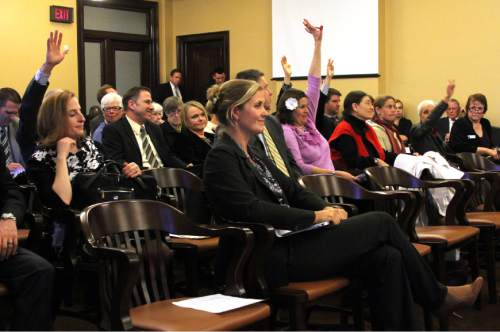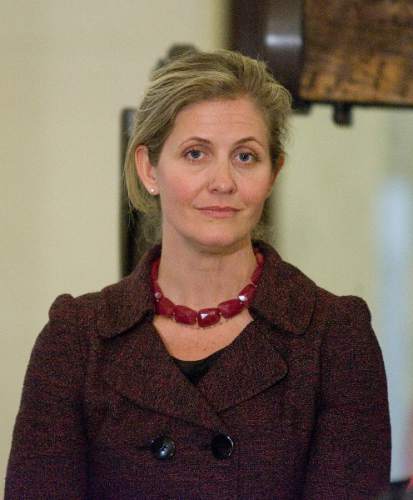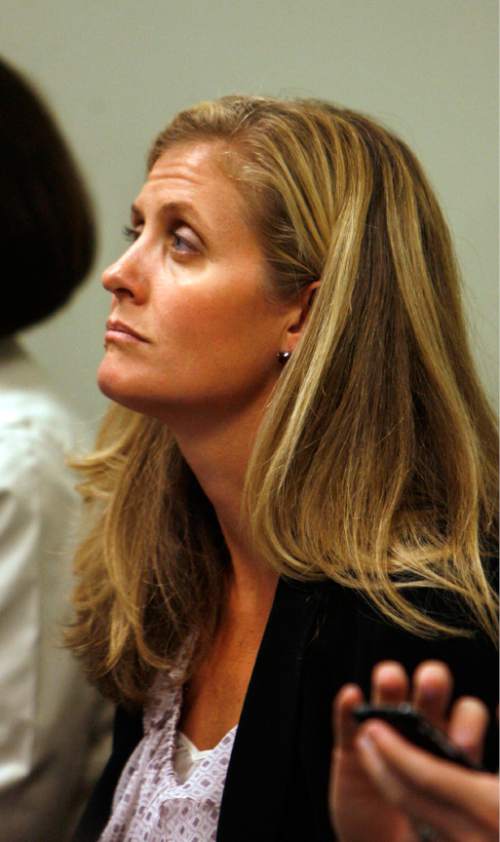This is an archived article that was published on sltrib.com in 2015, and information in the article may be outdated. It is provided only for personal research purposes and may not be reprinted.
A woman at the center of some of Utah's most pressing environmental challenges — from the waste we store to the air we breathe and the water we drink — is leaving her post.
Utah Department of Environmental Quality Executive Director Amanda Smith will step down next month after six years on the job, Gov. Gary Herbert announced Thursday.
Smith, a former Nature Conservancy attorney, was hailed as a superb collaborator and "peacemaker." Then-Gov. Jon Huntsman Jr. tapped Smith, his legislative director, in 2009 to replace former DEQ Executive Director Rick Sprott as the state's top environmental regulator.
Herbert said Smith made the department, which employs 378 workers in six divisions, more efficient by removing bureaucratic roadblocks, which he believes improved environmental protection.
"Amanda's leadership on environmental issues, perhaps most notably air quality, has changed the conversation in this state," the governor said.
Smith said she is leaving to pursue work in the private sector, although she has no job lined up yet.
"I feel fortunate that I had this opportunity to work on behalf of the state," she said. "The caliber of the people at DEQ and their dedication to protecting the environment and public health has been outstanding. DEQ is well-positioned, both financially and the staff and processes that have changed, to move forward and make a difference."
Smith's departure comes just as DEQ is poised to make a decision on one of the most contentious proposals studied under her watch: the disposal of depleted uranium. Other major issues she shepherded were the Red Butte oil spill and the crafting of a state implementation plan for reducing fine-particulate air pollution along the Wasatch Front.
"Amanda has always been open to new ways of solving problems and listening to all perspectives," said Steve Sands, chairman of the air quality board and director of external affairs for Rio Tinto Kennecott.
More recently DEQ, under directions from Herbert, proposed a seasonal ban on wood burning, which spurred an intense backlash that prompted a law preventing any seasonlong ban.
"She has faced huge challenges, particularly in our state's political climate," said Tim Wagner of Utah Physicians for a Healthy Environment. "The governor backtracked and allowed that bill to pass. Anyone would be frustrated under those circumstances."
Smith received her law degree from Gonzaga University and worked on environmental campaigns, eventually directing governmental affairs for the Nature Conservancy before Huntsman hired her to serve as his legislative director. In May 2009, Huntsman nominated Smith to replace Sprott, shortly before President Barack Obama nominated the Utah governor to serve as ambassador to China.
As a result, Smith did not work under the governor who appointed her, but under Huntsman's successor.
"She has been a valuable member of my Cabinet and a tremendous public servant who realizes we face unique challenges in Utah, and we are determined to find Utah solutions," said Herbert, who was Huntsman's lieutenant governor. "Her work to improve air quality in the Uinta Basin is a prime example of her leadership. We are not simply waiting for the federal government to declare the area to be in nonattainment of standards, we are making significant improvements now."
Smith's last day is May 22.
Her tenure drew praise from environmental activists, who say they will miss her.
"She has done a remarkable job, considering what she's had to deal with," Wagner said. "We would hope the governor would find someone with similar priorities and willingness to engage the community. Someone with her skills and talents, she won't have any problems."
Even though HEAL Utah often disagreed with Smith's decisions, Executive Director Matt Pacenza appreciated her openness.
"We've always known that Amanda is motivated by a genuine desire to protect public health and the environment," he said, "and we've appreciated her intelligence, frankness and willingness to consult with advocates."
Smith said state investments in science and human resources will be crucial to ensure Utah regulations are appropriate and effectively implemented.
"The biggest challenge the department faces will be attracting and retaining the type of talent the state needs to solve these complicated issues, especially in air and water quality," Smith said. "I would encourage the leadership to ensure the pay scale and bonus structures are in place to get the right people."







